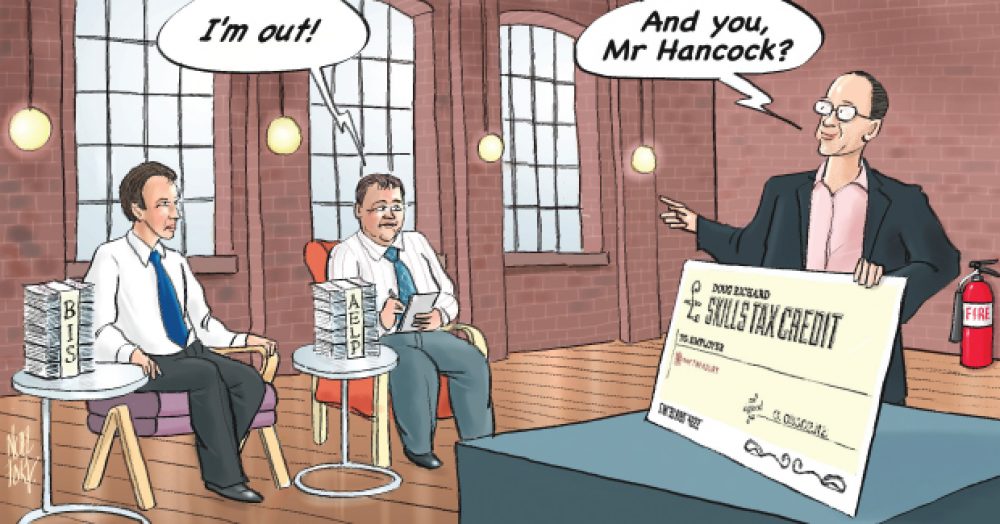Entrepreneur Doug Richard has reignited his argument with the Association of Employment and Learning Providers that workforce tax breaks were “integral” to the success of apprenticeships.
The former Dragons’ Den investor spoke out in the lead-up to the sixth National Apprenticeship Week when FE Minister Matthew Hancock is due to respond to his government-commissioned report into apprenticeships.
The association rejected Mr Richard’s claims that tax breaks would encourage employers to take on apprentices, although he remained “convinced” that they were the way forward.
“We need to focus on securing workforce tax breaks,” he told FE Week.
“The Association of Employment and Learning Providers quickly rejected my recommendations; however, I am still convinced that tax credits are integral to the success of apprenticeships.”
He said apprenticeships were valuable initiatives that must be made as “attractive as possible to employers.”
“Offering workforce tax breaks is an excellent way to make that happen,” he said.
But Graham Hoyle, the association’s chief executive, said the group still “seriously questioned” Mr Richard’s proposal.
Some of the big things are wrong”
He said credits might have the “advantage of simplicity” but could cause cash flow problems – the “biggest threat” to otherwise effective and profitable SMEs.
He said to ask “invariably cash–strapped” SMEs to purchase apprenticeship training up front and wait for a retrospective tax deduction was “bizarre and unworkable”.
“We have no objection to making the option available but doubt whether it would be a successful vehicle to switch SMEs on to the apprenticeship route,” he said.
When Mr Richard’s report was published in November last year, the association rejected his key recommendations for a closer relationship between employers and providers, with employers paying providers directly for apprenticeship training with tax credits, or other forms of government incentives, dished out later.
It said the review “created a hugely damaging picture” from its front cover illustrated with various tools to its “lack of understanding”. It also said that “some of the big things are wrong” and that Mr Richard’s assertion that the report be accepted on an “all-or-nothing” basis was like a “diktat”.
Mr Hoyle said one of Mr Richard’s key recommendations — that “testing and validation process of apprenticeships should be independent and genuinely respected by industry” — particularly upset members.
Mr Richard, a Californian who made his money though technology transfer, bit back on Twitter, dismissing the group’s reaction as “self-interest”. He told FE Week at the time that his proposals were not “a laundry list” from which the government could pick the elements that it wanted.
His findings have since been considered by the government and Mr Hancock is due to make an announcement on the its response later this week.









I do hope we get something out of this review as recently there seems to be a great deal of money being spent on one review or another from various “professionals”. What’s the point if government continues to ignore recommendations?
Our government often hire experts and then ignore them. Perhaps in this age of social media they should choose their experts more carefully. Doug Richard is one of the most well know, respected and connected business people in the country. Should we be surprised if Doug turns to twitter to share his frustration with his 16,000 new best friends?
Eleven years later and I remembered this article as we attempted to take on several young apprentices.
I don’t think things have changed in the apprentice space. There are so many enthusiastic young people who have skills, often IT related, that would benefit businesses across the board. It seems many employers, especially those which you would class as office based, would rather hire via agencies than engage in apprentice schemes. Those who do explore apprenticeships face a familiar British challenge: excessive bureaucracy.